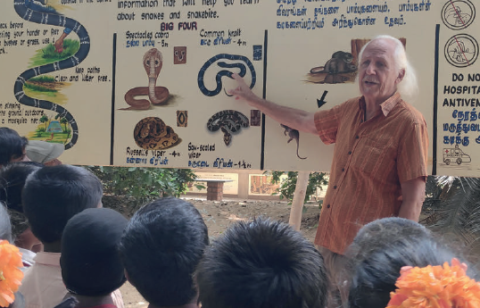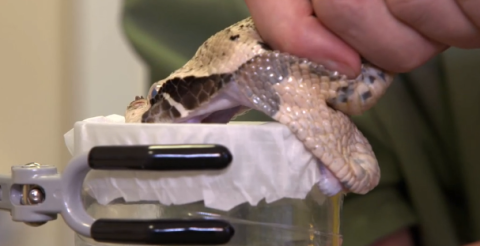Community groups play a vital role in tackling snakebite

To mark International Snakebite Awareness Day on Thursday 19 September, RSTMH is publishing a report on community groups from around the world who are currently leading the fight against snakebites locally, as well as hosting a day of events at the European Congress on Tropical Medicine and International, which we are hosting in Liverpool.
International Snakebite Awareness Day is a chance to increase the profile of snakebite and its impact – currently the World Health Organization estimates that up 138,000 people are killed each year by snakebite envenoming and around 400,000 are left permanently disfigured or disabled as a result of being bitten by snakes.
The journey to prevention starts at the community level
The special report – edited by Professor Robert Harrison from the Centre for Snakebite Research and Interventions at the Liverpool School of Tropical Medicine – tells stories of people who have suffered from snakebite, as well as demonstrating the extraordinary humanitarian contributions made by community groups around the world.
Like many other neglected tropical diseases, the journey to reduction and elimination is complex – but it often starts with people working on the ground with local communities trying to prevent harm and educate those most in danger.
The context of the fight against snakebite
Since the first International Snakebite Awareness Day in September 2018, there has been a lot of progress in tackling this neglected disease.
In May came two exciting announcements: the World Health Organization, (WHO) launched its strategy to halve global snakebite mortality rates by 2030 and Wellcome Trust revealed a new £80m/seven-year snakebite research programme.
Until these announcements translate into numbers of snakebite casualties falling however, what of the snakebite victims who live in remote, rural communities served by under-resourced health facilities with inadequate access to expensive antivenom treatment?
Community groups in Eswatini, India and the Philippines
The Eswatini Antivenom Foundation (EAF), the Remote Envenomation Consultancy Services (RECS) in the Philippines, the Madras Crocodile Bank Trust in south India and the Snakebite Healing and Education Society (SHE) in west India all provide health benefits to their communities but are reliant on small, unstable incomes and the commitment of volunteers.
Interestingly, the report found that although the community groups are of varying sizes, work in different locations and carry out a wide range of activities, the challenges they face are very similar.

The Eswatini Antivenom Foundation (EAF) want to ensure that snakes and snakebite are not considered synonymous and that envenomed victims can access effective treatment. They increase public awareness of snakes and snakebite prevention, safeguard the supply of safe, effective and affordable anti-venom and provide advice to clinicians. In October 2019, they plan to open a Snakebite Research and Intervention Centre.
The Snakebite Healing and Education Society (SHE) is a civil society group working in eight states in India. They build capacity of medical personnel and community health workers, offer training in snakebite first aid and facilitate the distribution of free anti-venom.
The Madras Crocodile Bank Trust has decades’ worth of experience of working with communities. As well as having reached over 700,000 people through their snakebite awareness programmes and workshops, they undertake research on geographical variation in venom and maintain a database for snakebite mortality and reporting.
RECS in the Philippines delivers training on snakebite prevention and treatment across the archipelago. One of their goals is to ensure that emergency drugs and ventilation equipment are available in remote hospital facilities.
As mentioned above, the challenges faced by these groups are fairly uniform and include:
- Delays in treatment, due to long distances, multiple hospital referrals or difficult geographies,
- Poor medical infrastructure,
- Belief in faith healers, although this is more prevalent in India
- Lack of accurate death and disability data
The report notes that, although lack of antivenom is a challenge, simply increasing the doses of antivenom of amount available will not necessarily save lives.

RSTMH, ECTMIH 2019 and snakebite
We are thrilled to continue our history of publishing articles and reports on snakebite, something we have been doing since 1921 in our journal, Transactions.
As a part of the community working on snakebite, we are keen to help reduce the number of deaths and disability caused by snakebite envenoming. We aim to do to this by encouraging snakebite research through our small grants programme, publishing a special issue of Transactions on snakebite in early 2020 and ensuring that snakebite remains on the agenda for our events and in our policy work.
In recognition of the importance of the issue of snakebite and to mark International Snakebite Awareness Day, we have a full day of activities taking place at the European Congress on Tropical Medicine and International Health (ECTMIH 2019).
As well as launching the report mentioned above, we will be screening videos dealing with different aspects of this neglected tropical disease. Finally, we will host a snakebite workshop to highlight current progress in the work to tackle snakebite, as well as some of the remaining and the support available for research on snakebite.
The panel will include Professor Rob Harrison and Dr David Williams, as well as Dr Mwele Malecela, WHO Director, Neglected Tropical Diseases; Dr Gabriel Alcoba, MSF Tropical Medicine Adviser; Dr Diogo Martins, Wellcome Trust and Ben Waldmann, Health Action International.
Follow the hashtags #ECTMIH2019, #snakebiteawarenessday and #stopsnakebite on social media for updates from around the world.